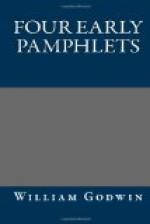The following is the character of the impostor, as sketched by the accurate and judicious pencil of our historian. We will leave it to the judgment of our readers, only observing, that Mr. Gibbon has very unnecessarily brought Christianity into the comparison; and has perhaps touched the errors of the false prophet with a lighter hand, that the disparity might be the less apparent.
“But Heraclius had a much more formidable enemy to encounter in the latter part of his reign, than the effeminate and divided Persian. This was the new empire of the Saracens. Ingenious and eloquent, temperate and brave, as had been invariably their national character, they had their exertions concentred, and their courage animated by a legislator, whose institutions may vie, in the importance of their consequences, with those of Solon, Lycurgus, or Numa. Though an impostor, he propagated a religion, which, like the elevated and divine principles of Christianity, was confined to no one nation or country; but even embraced a larger portion of the human race than Christianity itself.
“Mahomet, the son of Abdallah, was born on the 9th of April, 571, in the city of Mecca. Having been early left an orphan by both parents, he received an hardy and robust education, not tempered by the elegancies of literature, nor much allayed by the indulgencies of natural affection. He was no sooner able to walk, than he was sent naked, with the infant peasantry, to attend the cattle of the village; and was obliged to seek the refreshment of sleep, as well as pursue the occupations of the day, in the open air[A]. He even pretended to be a stranger to the art of writing and reading. But though neglected by those who had the care of his infancy, the youth of this extraordinary personage did not pass away without some of those incidents, which might afford a glimpse of the sublimity of his genius; and some of those prodigies, with which superstition is prompt to adorn the story of the founders of nations, and the conquerors of empires. In the mean time, his understanding was enlarged by travel. It is not to be supposed that he frequented the neighbouring countries, without making some of those profound observations upon the decline of the two great empires of the East and of Persia, which were calculated to expand his views, and to mature his projects. The energies of his mind led him to despise the fopperies of idolatry; and he found the Christians, in the most unfavourable situation, torn into innumerable parties, by the sectaries of Athanasius, Arius, Eutyches, Nestorius. In this situation, he extracted that from every system that bordered most nearly upon the dictates of reason, and framed to himself a sublime doctrine, of which the unity of God, the innocence of moderate enjoyment, the obligation of temperance and munificence, were the leading principles. But it would have contributed little to his purpose, if he had stopped here.




